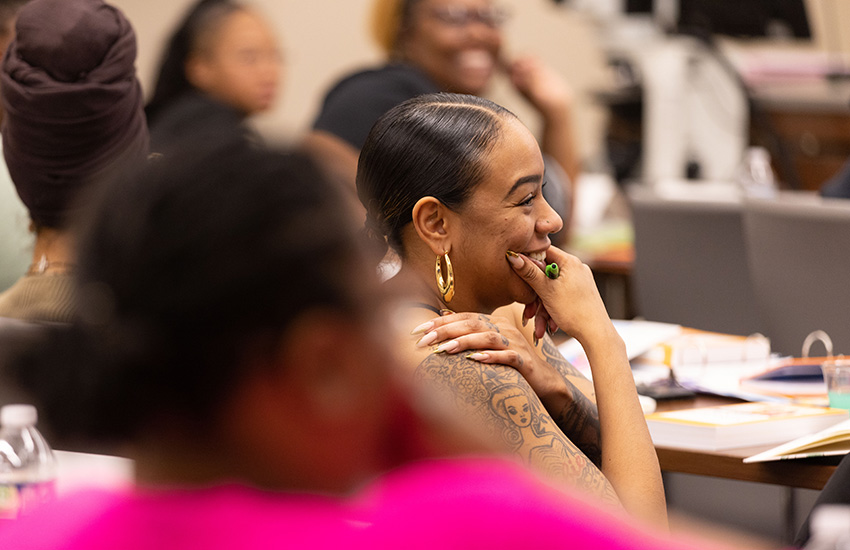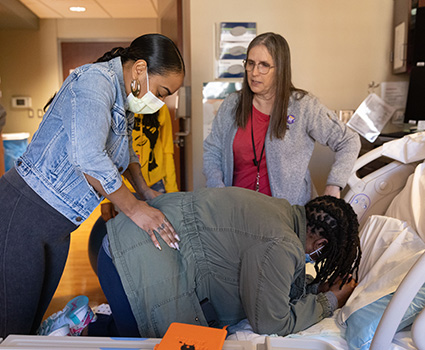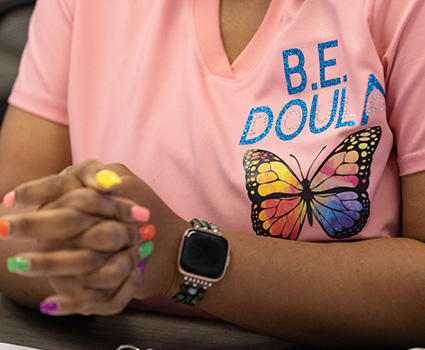 Students in I Be Black Girl's Doula Passage Program train at UNMC/Nebraska Medicine. The program is a space for Black women and femmes to learn the necessary skills and knowledge to support and enhance the birthing experiences and outcomes for Black people and their infants.
Students in I Be Black Girl's Doula Passage Program train at UNMC/Nebraska Medicine. The program is a space for Black women and femmes to learn the necessary skills and knowledge to support and enhance the birthing experiences and outcomes for Black people and their infants. By Ashia Aubrey
Content warning: This story contains sensitive details pertaining to miscarriage, parental, and child death.
At just nine weeks pregnant with her second child, Brittney Rose found herself among the many Black women who, unfortunately, face a higher risk of miscarriage—up to 43%.
Rose recalls the distressing sight of bleeding intensifying throughout the day, seeking help from a nurse, and rushing to the emergency room. As she anxiously awaited her doctor's appointment during the first trimester of her pregnancy, Rose couldn't shake the feeling that something was wrong.
“I kept going back and forth between, I might walk out of here without a baby, or they're gonna send me home and be like, everything's fine,” she said.
At the hospital, she miscarried. “I went to the bathroom, and I just felt the baby just leaving my body.”
After she grappled with a torrent of emotions, including confusion and self-blame, Rose used her pain to ignite her passion to become a doula. When she birthed her first child, a now 2-year-old, she wasn’t knowledgeable about doula work and never considered it a possibility for her birthing experience.
Following her miscarriage, Rose was certain she “wanted to help other women that have been experiencing what I had, [and] I just knew I needed to be in this space of birth work and just other Black women like me.”
She enrolled in I Be Black Girl’s Doula Passage Program (DPP) to receive training as a full-spectrum doula. The Doula Passage Program is spearheaded by I Be Black Girl, a Nebraska-based nonprofit dedicated to advancing reproductive justice including affordable child care, extending postpartum support, and the protection of natural hair in the workplace and schools for Black women, femmes, and girls. With a focus on learning and support, the Doula Passage Program is a space for Nebraska-based Black women and femmes to learn the necessary skills and knowledge to support and enhance the birthing experiences and outcomes for Black people and their infants.
Rose says she wants to be a beacon of hope and educate other Black women who are not aware doulas are an option for their birthing experience.
Doulas are trained companions who support an individual and their partner, family, and friends during and after labor and birth to foster a feeling of safety and comfort while working alongside health care professionals, according to SisterWeb. Research shows that when a pregnant person lacks support during childbirth, it can have negative consequences for both her and the baby. Incorporating doulas during childbirth could reduce the need for cesarean deliveries, among other possible pregnancy complications, and improve labor outcomes for both the expectant mother and the baby.
 Simulations at Nebraska Medicine replicate the childbirth experience.
Simulations at Nebraska Medicine replicate the childbirth experience.The organization's executive director, Ashlei Spivey, said the Doula Passage Program was created to “support power and choice for Black pregnant people giving birth in Nebraska.”
When planning for the program, Spivey says they found there were only a handful of Black doulas in Nebraska. That encouraged them to develop the program to “train Black women and femmes to go into doula work, but also recognizing that it was a workforce need,” Spivey said.
By producing more Black doulas in Nebraska, the organizers hope the program can be a lever of change for the state and country. Nationwide, the racial disparities in Black maternal health are grave, and the maternal mortality rate continues to heighten each year in the United States.
Maternal mortality is the term for when a mother passes away due to a health issue related to pregnancy or an existing condition that is worsened by pregnancy. It can occur at any point while a person is pregnant or one year after their pregnancy, according to the Centers for Disease Control and Prevention. In 2018, there were 17.4 deaths per 100,000 live births, and in 2021, that number surged to 32.9 deaths.
Some other sobering statistics:
- Pregnancy-related deaths are three times more common among Black women than white women. The CDC reports that in 2021, the maternal mortality rate for Black women in the United States reached an alarming 69.9 deaths per 100,000 live births.
- COVID-19 contributed to 25% of maternal fatalities in 2020 and 2021.
- Health and Human Services officials and stakeholders said the pandemic also exacerbated issues related to maternal health disparities, such as health care accessibility.
Nebraska is also grappling with this issue. According to data from I Be Black Girl, Nebraska’s maternal mortality rate in 2019 was 28.2 maternal deaths per 100,000 live births. The infant mortality rate
was the highest for Black babies during 2018–2020.
Experts believe 80% of pregnancy-related deaths in the United States are preventable.
“Maternal health and infant health are a predictor of a country's overall health and well-being,” said Dr. Andrea Jones, a University of Nebraska Medical Center professor and family medicine physician.
Nebraska also faces the challenge of maternity care deserts and disparities for Black and Native infants, along with vulnerabilities in reproductive and health care services.
Maternity care deserts refer to counties where women face limited or no access to essential maternity health care services.
Seventy-one percent of counties in Nebraska are maternity care deserts, according to the
March of Dimes Maternity Care Desert report.
 Thirty-seven women have completed the doula program so far.
Thirty-seven women have completed the doula program so far.
Health care professionals and doula workers have raised concerns about the limited access pregnant individuals have to doula services, emphasizing the need for insurance providers to intervene. “We have to improve these outcomes,” said Jones, who believes the
recent expansion of Medicaid health care coverage in Nebraska for women after childbirth for a full year is a step in the right direction.
“Addressing provider bias” is also a proactive measure Jones believes can reduce these disparities in Nebraska.
“Having that doula figure who is seen as part of the health care team that can actually directly talk to the maternal health team, it makes a huge difference,” she said. That “can improve the [birthing] experience as well as outcomes.”
The doula program takes an equitable approach to the birthing experience and their training. The group learned about racism in medicine and understanding the maternal health landscape, especially for underrepresented people.
The program lasts 14 weeks. The women spend five hours each week discussing topics related to maternal and infant care, like understanding secondary trauma self-care, advocating for, and working with a client, and offering emotional and practical support during difficult times.
Nebraska Medicine provides facilitators for certain program modules including gaining practical experience in a medical setting and understanding how to care for LGBTQ+ patients and families effectively. Black maternal health is a focus at the hospital, and their partnership with the doula program allowed them to integrate their medical experience and training.
“We went into what are the basics, what are some of the things that you need to do to be proactive and preparing your patient when they're getting ready to birth,” said Shanda Ross, the director of engagement, outreach, and belonging at Nebraska Medicine. “Creating a birth plan and making sure that they can communicate that to the physician, knowing what looks normal, but then what looks abnormal, and then we took them to what we call our simulation on the obstetrics floor.”
Through simulation, the group was able to replicate the experience of childbirth by interacting with various medical tools and equipment found in a patient's room for a more realistic and hands-on approach.
The program’s focus is full-spectrum doula work, from prenatal, to labor, delivery, and postpartum. Thirty-seven women have completed the program and are in the process of meeting the program’s requirement of completing three births.
“We also provide a stipend for the folks that participated in those 10 weeks, and we recognize, understanding the pay equity gap in our economic position, that we have to pay people for their time,” Spivey said. “We [Black women] lead the majority of our households, we have the highest pay equity gap, so this could really be a path forward for us as individuals and changing our economic trajectory.”
Doula services range in cost from around $1,000 to $5,000 per client and are currently not covered by state insurance, though some private insurance plans do cover this cost. Jones said insurance coverage could ensure that doulas are adequately supported and fairly compensated.
“That's one area where I really see an opportunity that insurance and the payers can help support,” she said. “So that we get that coverage for patients, and they get the value they need from their birthing experience.”
The
U.S. Department of Labor reveals that Black women have higher workforce participation rates than other women, 58.8% compared to 56.2% for women overall in 2020. The pay gap for Black women is staggering, at 63% of white, non-Hispanic men’s earnings, a bigger gap than white, non-Hispanic women, at 78.7%, and Asian women, at 87.1%.
Spivey says the program leaders were aware of the pay equity gap among Black women and started the Doula Passage Program to help change that.
“That's what really sets our training program apart from others is that we do have this workforce perspective to what we're doing," Spivey said. “As well as providing that business coaching of what does it mean to be an entrepreneur, leading your own practice.”
Jessica Ehule, the birth justice program manager for I Be Black Girl, said the program is committed to research and encourages community members to share their unique birthing experiences. This collaborative approach not only shapes future innovations but also enhances the significance of doula work for Black individuals in Nebraska.
“What we've heard from people throughout the state is that they do need support systems, or maybe they didn't even know that they could advocate for themselves in specific ways,” Ehule said.
Ashia Aubrey is a digital communications specialist at the Buffett Early Childhood Institute at the University of Nebraska. Previously, she was the associate director of communications at an Omaha nonprofit and served as a reporter and television news anchor in Nebraska, Virginia, and Washington, D.C.
Have a question, comment, or a story idea? Reach Ashia at ashiaaubrey@nebraska.edu.